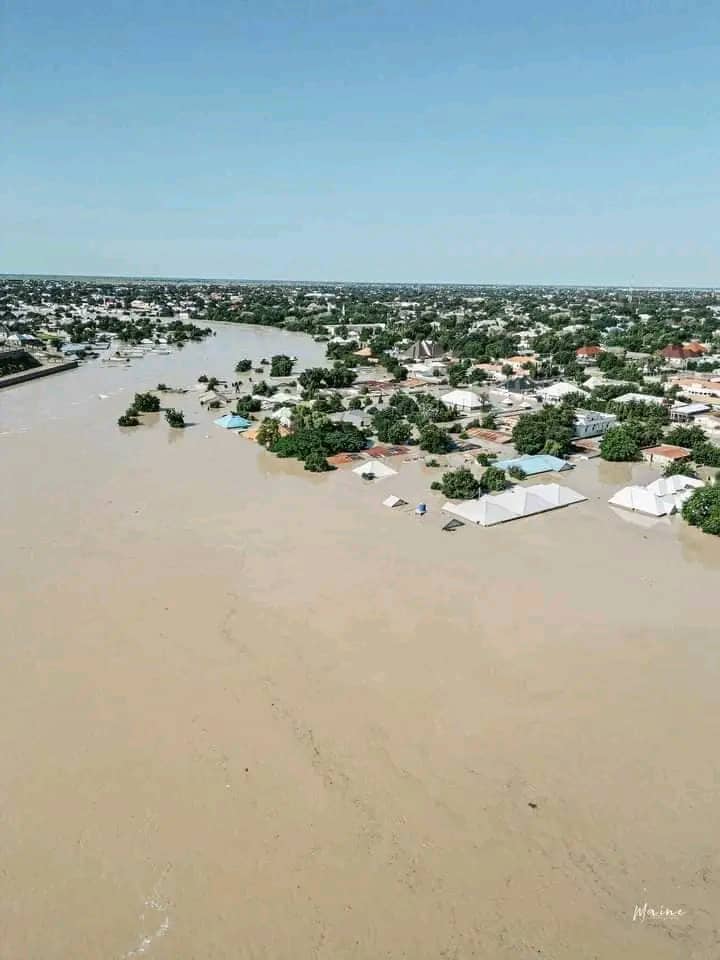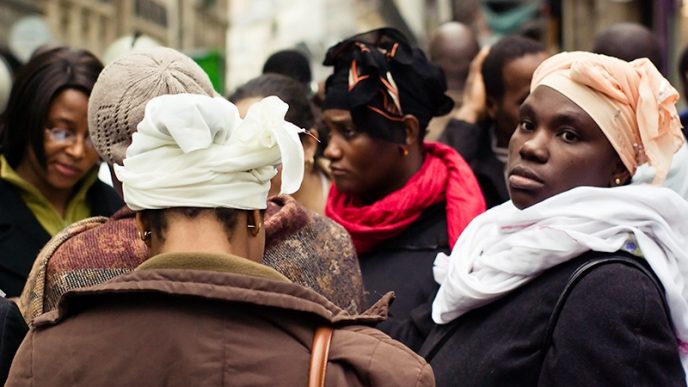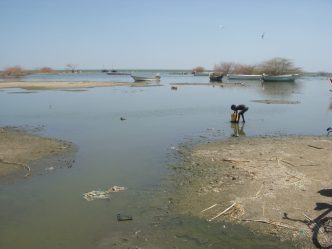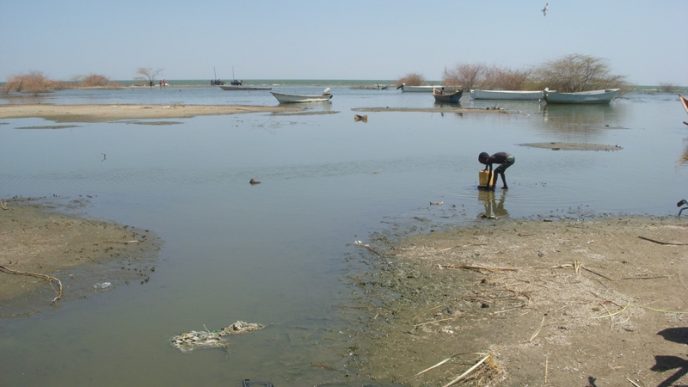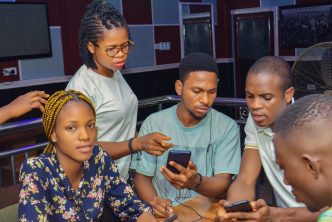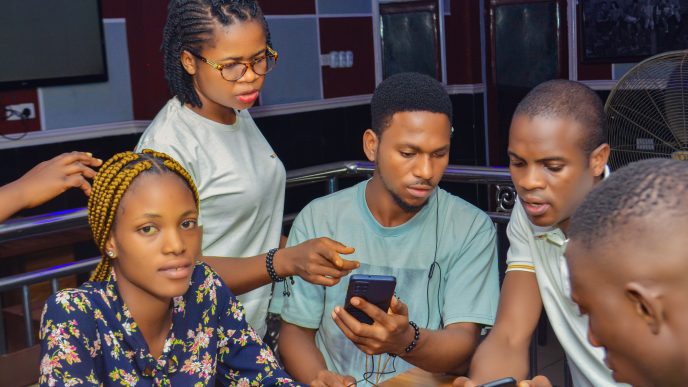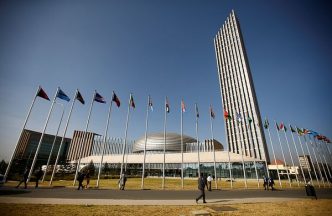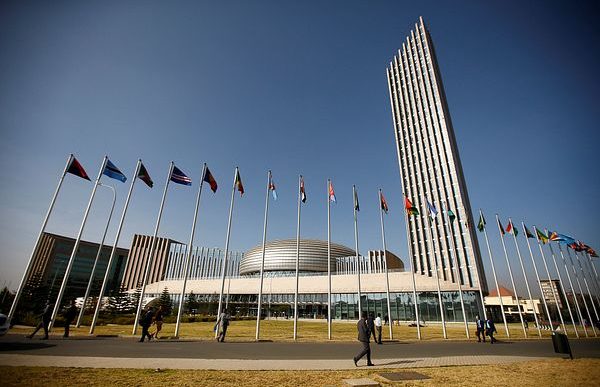Abstract
This study explores how social media narratives reflect public discourse on climate change in Nigeria, using the September 2024 Borno flood as a case study. Employing artificial intelligence (AI) methods, specifically natural language processing (NLP) and sentiment analysis, the research analyses tweets from public figures, organisations, and individuals between September 2024 and April 2025. Through a combination of manual qualitative coding and sentiment labelling, the study identifies emerging themes around climate change awareness, government negligence, and humanitarian aid efforts. Findings reveal that 50% of social media posts expressed negative sentiments, particularly blaming government officials for corruption and mismanagement of the dam and disaster relief. Positive sentiments (35%) centred largely on donations and aid initiatives led by private citizens and NGOs. Neutral posts (15%) were primarily informational. Although explicit references to climate change were less frequent, there is growing climate consciousness within public discussions. Overall, the study highlights the power of social media in amplifying citizen voices, exposing governance failures, and promoting solidarity during disasters. It underscores the importance of transparent governance, climate-resilient planning, and the role of non-state actors in effective disaster response. This research contributes to understanding the evolving intersection of AI tools and public discourse analysis in Nigeria.
Keywords
Climate change, social media, Nigeria, Twitter, X, government negligence,
Introduction
Social media platforms have increasingly become critical arenas for discussing environmental disasters, shaping public opinion, and influencing governance responses (Hu et al. 2023). This study examines social media narratives around the September 2024 Borno flood to analyse public discourse on climate change, perceptions of government response, and the role of humanitarian aid. The main objectives are to identify emerging themes, sentiment patterns, and the growing intersection between climate awareness and disaster discourse in Nigeria.
Existing literature, such as Mundt et al. (2018) and Walsh (2020), has shown that social media amplifies voices during crises and can either reinforce or challenge official narratives. In Nigeria, studies such as Adam and Fazekas (2021), Gumbi and Baba (2024), and Omilusi (2025) have pointed out that online activism often highlights governance failures while pushing for accountability and transparency. However, fewer studies have focused on how climate change discussions are woven into such digital conversations following localised disasters.
This research uses a combination of natural language processing (NLP) techniques and manual sentiment analysis to study tweets related to the Borno flood, posted between September 2024 and April 2025. A thematic coding framework was applied to identify dominant narratives across the dataset. By applying AI methods like NLP within public discourse analysis, this study highlights the evolving integration of computational tools into environmental and communication research disciplines. Understanding social media discourse is crucial in Nigeria, where growing digital engagement increasingly influences both political accountability and climate action awareness.
Methodology
This study explores the narratives surrounding the Borno flood by analysing 500 X (formerly Twitter) posts from public figures, organisations, and individuals between September 2024 and April 2025. The research question focuses on how climate change, government negligence, and aid efforts are discussed. Using natural language processing (NLP) and manual sentiment analysis, the posts were categorised into themes such as climate change awareness, government accountability, and humanitarian support. Sentiment labelling was applied to classify tweets into positive, negative, or neutral categories. The framework draws on social media discourse analysis to evaluate public sentiment and narrative shifts. After the paper was written, it was fed to ChatGPT for grammatical errors and refinement.
Ethical Considerations
Ethical guidelines were adhered to by anonymising users’ identities and ensuring consent for public data usage.
Findings
The analysis of 500 X (formerly Twitter) posts revealed several key themes regarding the Borno flood and climate change awareness. Firstly, while climate change was frequently referenced, the explicit link between the flood and climate change was more common among organisations and public figures such as @FAONigeria and @oxfaminnigeria. However, individual users were less likely to frame the disaster in this way, highlighting a gap in grassroots climate consciousness.
The findings reveal that government negligence dominated negative sentiments (50%), while donations and non-governmental efforts attracted positive responses (35%). Climate change awareness, although emerging, remained secondary, taking up the remaining 15% for neutral sentiments. The negative sentiments involved discourse that expressed anger towards government negligence and corruption, especially regarding negligence of the environment and mismanagement of relief funds. Notable accusations included the embezzlement of flood victim funds by Governor Zulum of Borno State, as voiced by users like @OfficialAzzaki, and widespread distrust about the distribution of aid. The critiques largely centred on inefficiency and lack of transparency, similar to public sentiments observed after previous flooding events in Nigeria. Relief efforts were largely praised, especially those by NGOs and individuals, making up the positive responses. While government initiatives were viewed with scepticism, private donations were recognised for their swift and impactful response.
Linking this to the Ogunpa flooding, it becomes evident that historical government inaction, such as after the catastrophic floods of the 1980s, has been a recurring theme. Like Borno, the Ogunpa flood disaster faced similar government negligence, leading to repeated flooding events, including in 1960, 1963, 1978, 1980, and 2011 (Adegbola 2012). The failure to implement lasting infrastructure solutions or provide adequate response remains a critical issue, underlined by both the Ogunpa and Borno flood cases.
Interestingly, the analysis also revealed a gap in effective AI or sentiment analysis tools for fully capturing the nuance of local languages and dialects, which may have limited the depth of certain social media sentiments. Moreover, traditional manual coding proved time-consuming and limited in scope, suggesting a need for more refined AI models capable of identifying subtle shifts in public mood.
Interdisciplinary Implications
This research bridges the fields of climate studies, history, social media analysis, and digital humanities by applying natural language processing (NLP) to analyse public discourse on climate change in Nigeria. It has significant implications for Nigerian and African contexts, offering insights into public attitudes towards government response and climate change. The findings can inform policy development, especially in disaster preparedness and climate resilience strategies. In educational settings, the study demonstrates the value of integrating AI tools into social sciences. However, resource constraints in low-resource settings, such as limited access to technology and data, may hinder similar future research.
Conclusion
This study highlights the growing recognition of climate change in public discourse surrounding natural disasters in Nigeria, particularly the 2024 Borno flood. By analysing over 500 tweets using natural language processing (NLP) and sentiment analysis, we found that the public overwhelmingly blamed the government for inadequate disaster response, while also acknowledging the significant role of NGOs and private individuals in relief efforts. The sentiment analysis revealed a predominantly negative sentiment towards the government, with positive responses mainly centred on aid and donations.
Despite the valuable insights gained, there are limitations. Such as the exclusion of non-X (formerly Twitter) platforms and the inability to capture nuanced local narratives. Additionally, the focus on public discourse may not fully represent government action or broader societal responses. However, the study provides practical references for improving government transparency, climate-resilient policies, and disaster management. The findings suggest that social media can be a powerful tool for raising awareness and influencing policy, especially in contexts where traditional media may be limited.
The study also offers theoretical contributions by demonstrating the intersection of AI and social media in understanding public opinion. It is recommended that future research expand the scope to include more platforms and incorporate more localised data to provide a fuller picture of climate change narratives and governance.
Acknowledgements
If this research journey were a road trip, it would have involved wrong turns, flat tires, existential dread, and some very questionable gas station snacks. But also a lot of laughter, learning, and kindness from extraordinary people.
First, a huge shout-out to Habeeb Kolade and Khadijat Alade, who somehow managed to always answer random questions (even the ones that made no sense) without blocking me or changing their numbers. You both saved me more times than you know. To my mentor, Timilehin Durotoye, who saw the potential when all I saw was chaos, thank you for pushing and nudging me towards the finish line.
To the brilliant facilitators who lit up this journey with their wisdom and patience:
- Chinasa T. Okolo, PhD: Whose work in AI governance made me believe that research could change the world.
- Olanrewaju Samuel: Whose depth in phonology and computational linguistics made complex things sound beautifully simple.
- Timilehin Durotoye (yes, again, because once wasn’t enough).
- Najeeb G. Abdulhamid, PhD: For reminding me that ethnography is magic when done with heart.
- Tejumade Afonja: Whose journey inspires me to dream bigger and code better.
- Ayantola Alayande: For showing that governance isn’t just policies; it’s people.
- Kauna Malgwi: For fighting the good fight in content moderation and making it look easy.
- Nelson Olanipekun: For making the law, technology, and activism dance together.
- Frank (Onyeka) Ọnụ: For proving that even infodemics and digital humanities can be poetry.
- Joy Victor: For bringing data and storytelling into a beautiful marriage.
- Ololade Faniyi: For teaching that African feminist tech studies are not just important but urgent.
- Paschal Ukpaka: For exploring the metaverse when the rest of us were still trying to understand it.
- Ridwan Oloyede: For making law and innovation feel like best friends at a party.
- Samuel Segun, PhD: For reminding us that research is global, and governance is everyone’s job.
- Abiodun Modupe, PhD: For showing that big data can have a big heart.
Lastly, to the institutions, spaces—CafeOne (Challenge Ibadan)—for work and invisible hands that offered platforms, grants, libraries, or even just good WiFi when I needed it. Your support carried this work farther than you know. To all of you: thank you for being a light, a map, and sometimes even a rescue helicopter when the road got foggy. This work carries your fingerprints, your echoes, and your spirit.
References
Adam, Imran, and Mihály Fazekas. 2021. “Are Emerging Technologies Helping Win the Fight against Corruption? A Review of the State of Evidence.” Information Economics and Policy 57: 100950. https://doi.org/10.1016/j.infoecopol.2021.100950.
Adegbola, Adejoke. 2012. “Historical Rainfall-Runoff Modelling of River Ogunpa, Ibadan, Nigeria.” Indian Journal of Science and Technology 5 (5): 1–4. https://doi.org/10.17485/ijst/2012/v5i5.5.
Gumbi, Kolawole S., and Yusuf T. Baba. 2024. “Political Trust and Legitimacy Crisis in the Age of COVID-19: An Assessment of the EndSARS Protest in Nigeria.” Frontiers in Political Science 6. https://doi.org/10.3389/fpos.2024.1334843.
Hu, Tao, Xiaohui Huang, and Song Wang. 2023. “Actionable Environmental Science through Social Media Platforms.” In Springer eBooks, 355–71. https://doi.org/10.1007/978-3-031-41758-0_13.
Mundt, Marcia, Karen Ross, and Charla M. Burnett. 2018. “Scaling Social Movements through Social Media: The Case of Black Lives Matter.” Social Media + Society 4 (4). https://doi.org/10.1177/2056305118807911.
Omilusi, Mike. 2025. “Participatory Governance and Youth Protests in the Digital Age: Interrogating the #EndSARS Movement.” African Security, 1–24. https://doi.org/10.1080/19392206.2025.2474276.
Walsh, John P. 2020. “Social Media and Moral Panics: Assessing the Effects of Technological Change on Societal Reaction.” International Journal of Cultural Studies 23 (6): 840–59. https://doi.org/10.1177/1367877920912257.
Appendix
Table summarising the main tweets:
| Handle | Theme | Summary |
| @firehorse249791 | Climate Change | Warned of Lagos and Borno flood risks linked to climate crisis. |
| @PeterObi | Donations/Aid | Expressed sympathy for Borno flood victims and urged government intervention. |
| @Tripz1958092 | Donations/Aid Defence | Defended Peter Obi’s flood visit as purely humanitarian. |
| @ChidiNdumnego | Donations/Aid | Emphasised Peter Obi’s non-partisan visit to Borno flood victims. |
| @mazi_chiadikaebube | Governance Frustration | Linked the Borno crisis to regional injustice and security issues. |
| @OdogwuAkpos | Government Negligence | Criticised the selective focus on donations to flood victims. |
| @Okechukwu_Chinonso | Governance Frustration | Echoed frustrations about insecurity and marginalisation. |
| @fairviewafrica | Government Aid | Reported the Borno government’s two-year tax waiver for flood-affected traders. |
| @Yawagist_ | Government Aid | Confirmed the two-year tax waiver for flood victims. |
| @Union_tv1 | Government Aid | Confirmed Borno’s two-year tax waiver for traders impacted by floods. |
| @itz_flexible | Government Aid | Reiterated Governor Zulum’s two-year tax waiver for flood-affected businesses. |
| @OfficialAzzaki | Government Negligence/Corruption | Accused the Borno government of mismanaging flood funds. |
| @dazzy_kay | Government Negligence | Alleged misuse of flood relief donations. |
| @phredaa_ | Donations/Aid | Praised donations to flood victims, including Borno. |
| @oxfaminnigeria | Humanitarian Aid | Distributed hygiene kits to Borno flood victims. |
| @NEDCOfficialNg | Government Aid/Relief | Announced donation of an excavator and supplies for flood relief in Borno. |
| @Jidda_Jnr | Governance Frustration | Complained about palliative diversion in the Borno flood response. |
| @Gboye3000 | Governance Critique | Criticised the government’s priorities over flood victim welfare. |
| @TheTochligt003 | Donations/Aid | Reported Dangote committee’s donation of N1bn relief items to Borno. |
| @TheWhistlerNG | Donations/Aid | Reported the donation of N1bn worth of flood relief materials. |
| @SundiataPostNgr | Recovery Plans | Reported Governor Zulum’s request for World Bank support for flood recovery. |
Annotation of Words (Keywords)
| Word | Annotation |
| Flood | Natural disaster (Environmental Crisis) |
| Relief | Aid, Donations, Humanitarian Efforts |
| Tax waiver | Government Economic Support |
| Corruption | Governance Failure |
| Donation | Humanitarian Support |
| Boko Haram | Security Threat, Violence |
| Recovery | Post-Disaster Development |
| Excavator, Medical supplies | Infrastructure/Material Support |
| Marginalisation | Governance/Political Discontent |
| Palliative | Emergency Support, Relief Materials |
| World Bank | International Aid |
| N1bn | Large-Scale Donation |
| Humanitarian work | Philanthropy |
| Foundation (DIF) | Charitable Organisation |
Categories developed from the tweets:
| Category | Description | Example Handles |
| Climate Change/Environmental Risk | Tweets linking floods to climate issues | @firehorse249791 |
| Humanitarian Donations and Aid | Tweets praising or announcing donations to victims | @PeterObi, @Tripz1958092, @ChidiNdumnego, @oxfaminnigeria |
| Government Economic Support | Actions like tax waivers or equipment donations | @fairviewafrica, @Yawagist_, @Union_tv1, @NEDCOfficialNg |
| Governance Failure/Negligence | Tweets criticising government failure or corruption | @OfficialAzzaki, @dazzy_kay, @Jidda_Jnr, @Gboye3000 |
| Governance Frustration and Injustice | Tweets expressing dissatisfaction with the political response | @mazi_chiadikaebube, @Okechukwu_Chinonso |
| Disaster Recovery Plans | Initiatives to rebuild or seek global aid | @SundiataPostNgr |
| Large Philanthropic Donations | Corporate or organisational contributions | @TheTochligt003, @TheWhistlerNG |
